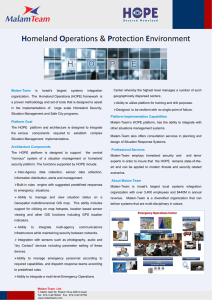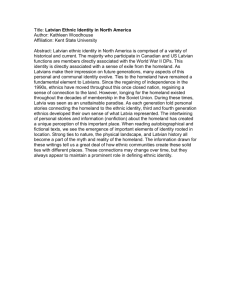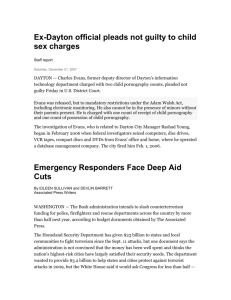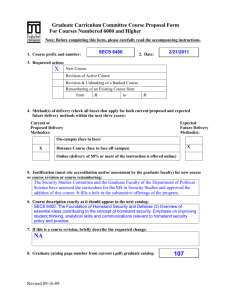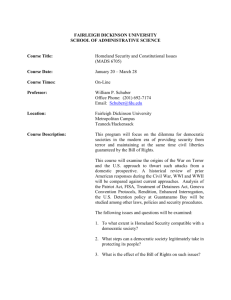Statement of - GlobalSecurity.org
advertisement
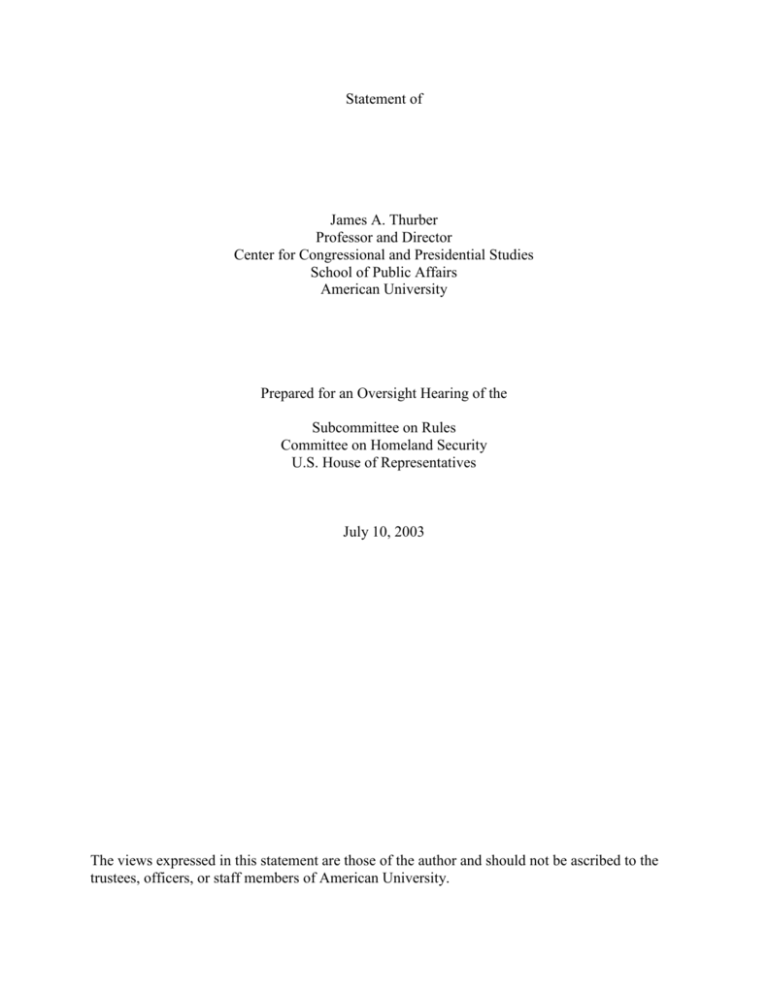
Statement of James A. Thurber Professor and Director Center for Congressional and Presidential Studies School of Public Affairs American University Prepared for an Oversight Hearing of the Subcommittee on Rules Committee on Homeland Security U.S. House of Representatives July 10, 2003 The views expressed in this statement are those of the author and should not be ascribed to the trustees, officers, or staff members of American University. Thank you for inviting me to testify before your subcommittee on the issue of whether the House committee organization, procedures and structure are organized adequately to address policy and oversight issues associated with homeland security. In the aftermath of September 11th , the continuing dangerous security threats to the nation, and the historic reorganization of twenty-two agencies employing over 175,000 workers into the new Department of Homeland Security to deal with those threats, your evaluation of the effectiveness of the House committee system to meet the challenge of homeland security is a crucial priority. Periodic consolidation and modernization of the standing committee system is necessary and this is certainly one of those times. That task is critical and directly related to the security of America and is called for in the legislation creating the new Department of Homeland Security (DHS): “It is the sense of Congress that each House of Congress should review its committee structure in light of the reorganization of responsibilities within the executive branch by the establishment of the Department,” (Title XV, Subtitle A, Section 1503). As a political scientist and founder (in 1979) and director of a non-partisan research center focused on Congress and the presidency, I have studied the congressional committee system from both outside and inside Congress for over thirty years. I was an American Political Science Congressional Fellow (1973-74) and staff member to U.S. Representative James G. O’Hara who served on the Committee on Organization, Study and Review of the House in 1973 that recommended major changes in Rules X and XI of the of the House of Representatives in 1974 and to Senator Hubert H. Humphrey, a strong advocate of Senate committee reform. Consequently, I also served as a Professional Staff Member of the U.S. Senate Temporary Select Committee to Study the Senate Committee System that successfully recommended a 1 restructuring of Senate committee jurisdictions in 1976. One of my responsibilities was to analyze jurisdictional overlap. I also worked on the committee jurisdictional changes associated with the Senate Committee on Energy and Natural Resources and the Senate Committee on Environment and Public Works. I also served as a Senior Research Analyst to the Commission on Administrative Review of the House in 1977. I assisted the Joint Committee on the Organization of Congress, co-chaired by Representatives David Dreier and Lee H. Hamilton, 1992 to 1994, on issues related to the congressional budget process reform and other topics. Many significant reforms stemming from the work of the Joint Committee were taken by the House in 1995, largely because of the leadership and work of Representative Dreier. I have also responded to requests by House committees and several Members of Congress over the last three decades to comment on proposed changes in House rules and the committee system, including that of Representative Louise Slaughter. I have authored, coauthored and edited several books and many articles related to the workings of the Congress, including: Congress and the Internet (edited with Colton Campbell), The Battle for Congress, Remaking Congress: Change and Stability in the 1990s (edited with Roger Davidson), A 130 History of the House Appropriations Committee, 1865 to 1995, the first six editions of Setting Course: A Congressional Management Guide, Rivals for Power: Presidential-Executive Relations, and Beyond Distrust: Building Bridges Between Congress and the Executive. I hope my thirty years of academic and practical knowledge of the operations of the Congress and the jurisdictional battles in the committee system can provide useful background information and lessons from past congressional reorganization efforts. 2 I am pleased to be asked to comment on how the House can be organized to more effectively handle issues of homeland security and the work with the new Department of Homeland Security. Create a Permanent Committee on Homeland Security As you know, the reorganization of the House committee system has already started with the creation of your Select Committee and the restructuring of the Committees on Appropriations, Armed Services, International Relations, Judiciary and the Permanent Select Committee on Intelligence to deal with jurisdictional matters related to homeland security. The next step in the process of improving the way Congress addresses issues of homeland security is to create a permanent standing committee in the House with its areas of jurisdiction over homeland security clearly designated in Rule X. I know that many powerful House members and their chiefs of staff are reported to be against creating a permanent Committee on Homeland Security because it would create major jurisdictional battles. This is not the time for your committee to shy away from the job of creating a permanent panel that will help reduce the risk of terrorism. Knowing full well the difficulty of committee jurisdictional change and taking into account the homeland security related reforms that have already occurred in the House, the focus of my testimony is on the need to create a permanent Committee on Homeland Security and the methods the House might consider in creating the new committee. I strongly recommend a permanent committee with clear primary jurisdiction over the Department of Homeland Security and the broader mission of keeping America safe from terrorism. This committee must take a vigorous lawmaking and oversight role over homeland security policy to be taken seriously by the executive branch, other House committees, and the American public. 3 Americans want to feel Congress is protecting the nation from future terrorist attacks. Creating a single permanent committee is consistent with other congressional responses to horrible events in history. I recommend the creation of a permanent Committee on Homeland Security with jurisdiction directly related to the agencies in DHS and generally to the mission of reducing the threat to homeland security. Jurisdiction from the standing committees related to the major agencies in DHS should be transferred to the permanent committee. They include the following twenty-two major entities and their committee jurisdiction: Committee on Agriculture (Animal and Plant Health Inspection Service, Plum Island Animal Disease Center), Committee on Armed Services (National Bio-Weapons Defense Analysis Center, National Communications System), Committee on Energy and Commerce (Strategic National Stockpile and the National Disaster Medical System), Committee on the Judiciary (Secret Service, Immigration and Naturalization Service), Federal Law Enforcement Training Center, Office of Domestic Preparedness, Domestic Emergency Response Teams, National Infrastructure Center), Committee on Science (CBRN Countermeasures Programs, Environmental Measurements laboratory, Critical Infrastructure Assurance Office, Federal Computer Incident Response Center, Energy Security and Assurance Program), Committee on Transportation and Infrastructure (Secret Service, U.S. Coast Guard, Federal Protective Service, Transportation Security Administration, Federal Emergency Management Agency), and Committee on Ways and Means (Customs Service). Experienced members (not necessarily the chairs) from the seven primary committees losing jurisdiction and other committees with related jurisdiction should form the basis of the membership of the Committee on Homeland Security. If the membership of the new committee were to come from these committees, it would possess the informed power to act quickly and 4 decisively when needed. “Grandfather” or transition rules should be made to allow the members of the new committee to hold the new assignment as well as their existing ones. This allows for better coordination among committees and there will not be a loss of institutional memory and expertise over homeland security issues from other committees. The jurisdiction of the new committee should also take into account the fact that most agencies dealing with homeland security are outside. These include the new Northern Command, the National Guard, the Federal Bureau of Investigation, the Central Intelligence Agency, the National Security Agency, the National Imagery and Mapping Agency, the Centers for Disease Control, and key elements of the Drug Enforcement Agency and the Department of Energy. Therefore, there will be a need for the new permanent panel to strengthen its focus and coordination with other committees such as Armed Services, Judiciary, and the Permanent Select Committee on Intelligence in order to have a comprehensive policy-making approach to homeland security and counter terrorism. The committee should also carefully designate some overlapping jurisdiction with programs in DHS with other committees; for example, the safety and transportation maritime responsibilities of the Coast Guard could overlap with the Committee on Transportation and Infrastructure and the food safety responsibilities of Animal and Plant Inspection Service could share jurisdiction with the Committee on Agriculture and the Customs Service’s function of promotion of trade with the Committee on Ways and Means. Shared jurisdiction with primary and secondary responsibilities for the functions of the entities in DHS is necessary and prudent to make sure that the old and new missions of these programs work smoothly. Reasons to Create a New Committee on Homeland Security 5 The ability of the House to write legislation, develop comprehensive policy in advance and in response to crisis, oversee the administration of laws, as well as represent the American people, organized groups, and state and local governments (including first responders to attacks), depends largely on the organization and management of the committee system. The House currently relies on a total of 13 standing committees (including Appropriations and the Permanent Select Committee on Intelligence) plus your committee and at least 38 subcommittees (see appendix for chart of committees) with jurisdiction over homeland security. Homeland Security Secretary Tom Ridge said of the turf question on the Hill: “I believe they’ll work their way through that maze of committees and subcommittees, and end up providing the kind of leadership we need at the congressional level.” This complex, competing and cumbersome jurisdictional juggernaut over homeland security generates dramatically different workloads, excessive competition among committees, scheduling conflicts, duplication of staff, and dissipation of technical expertise. The House committee system related to DHS and the mission of homeland security has too many standing authorizing committees with major jurisdiction over programs that have been transferred to DHS. On opening day of the 108th Congress, Speaker-elect Hastert implicitly offered the most important reason for a new Committee on Homeland Security: “Members of this select committee (Select Committee on Homeland Security) will oversee the creation of the Department of Homeland Security to make certain that the executive branch is carrying out the will of the Congress. This select committee will be our eyes and ears as this critical department is organized. …This House needs to adapt to the largest reorganization of our executive branch in 50 years, and this select committee will help us make this transition.” The House created a select committee with no primary legislative or oversight jurisdiction relying on the will of the 6 House leadership and the skill of its chair, Chris Cox, as well as the members of the committee to highlight the problems with DHS and homeland security, to get the department to implement its reforms and focus on new threats, and to educate the American public. The select committee does not have the formal power to bring a focus to all of the jurisdictional parts of the DHS, let alone the other aspects of homeland security in other departments. A permanent Committee on Homeland Security is the only way to effectively see whether DHS, and other homeland security programs, are doing their jobs of addressing the problems of terrorist threats. Other important reasons for the creation of a permanent Committee on Homeland Security are that it would help Congress carry out the will of the American people to improve the protection of our homeland and it would protect the constitutional powers of Congress and our system of checks and balances with the executive branch. If the Congress wants to be a player in homeland security policy and co-equal partner with the executive branch, it needs to create a permanent Committee on homeland security. This committee would also maintain coordination within the House and create a central point of contact in the House for the executive branch. The committee could increase efficiency of dealing with homeland security crises and issues that will arise. It could help equalize of the workloads of committees. It will ensure effective oversight of a crucial national priority and be the major eyes and ears of the House over DHS as it is struggles with a new culture and organization. The new committee could deal with homeland security in a comprehensive and coordinated way, reducing uncertainty in committee jurisdictions and decision-making related to the mission of homeland security. Methods of Establishing a Committee on Homeland Security One way to create the legislative and oversight jurisdiction over homeland security is through different patterns of bill referral. The House rules stipulate that the Speaker must refer each bill, 7 resolution, or other measure to a committee in accordance with the subject matter of the act and the jurisdictions of chamber panels (House Rule XII, Section 2). The Speaker’s referral authority, both as stated in the standing rules and specifically in section 4 of H.Res.5, the Speaker has discretion to refer matters either initially or sequentially to the select committee and then to other committees. The Speaker has all the authority he needs to refer bills to the Select Committee on Homeland Security, thus establishing it as the primary committee of jurisdiction. However, the select committee is not permanent and does not currently have the authority to consolidate jurisdictions and legislate through its own actions. Task forces, and ad hoc panels have been good temporary devices for dealing with major issues with multiple jurisdictions, illustrated by Speaker Tip O’Neill’s creation of an ad hoc committee to help pass the Carter energy plan through the house on an expedited basis. The creation of a temporary committee for the expedited passage of legislation to create the Department of Homeland Security is another example. However, these mechanisms are not a good permanent solution to handle high-priority issues such as homeland security. If another terrorist attack occurs, Americans will want one central focus on the issue on the Hill. Congress did not have a series of temporary panels after the attack on Pearl Harbor and the American people do not expect it to react to this crisis in an ad hoc fashion. The best way to create a permanent Committee on Homeland Security is to formally shift jurisdiction from existing standing committees along the lines elaborated above through changes in House Rule X. Concluding Comments on Committee Reform In describing how difficult it is to reorganize jurisdictions in the House committee system in the 104th Congress, Representative Dreier said, “You would have thought I was threatening 8 their wives…people would prefer to give me their first-born rather than give up a portion of their committee jurisdiction.” Members are profoundly conscious of the electoral effects of institutional arrangements when the House rules and procedures are changed. Members invest heavily in their assigned committees. Congressional committee organization has a perceived impact on the likelihood of reelection. However, voters do not care about the jurisdictional powers of congressional committees; they care if their representative can deal with the problems of homeland security or not. Members are astute political actors who understand the ramifications of changing the turf or jurisdiction of their committees and their ability to help constituents and get reelected, but the House must move beyond these worries. This committee is bound to meet with considerable resistance to any change in committee jurisdiction over homeland security--the greater the reform, the bigger the battle. Recommendations of major jurisdictional committee reforms will result in broadening the coalition of opponents, as we have seen with all House reorganization efforts since 1946. However, this committee should not be intimidated by the upcoming battle. It must move the House beyond policy deadlock, partisan bickering and turf protection on this important policy. Do not make homeland security a partisan issue in the 2004 elections. This is time for a bipartisan response to a real fear felt by every American. Create a permanent Committee on Homeland Security to deal with the terrorist threat to America. 9

